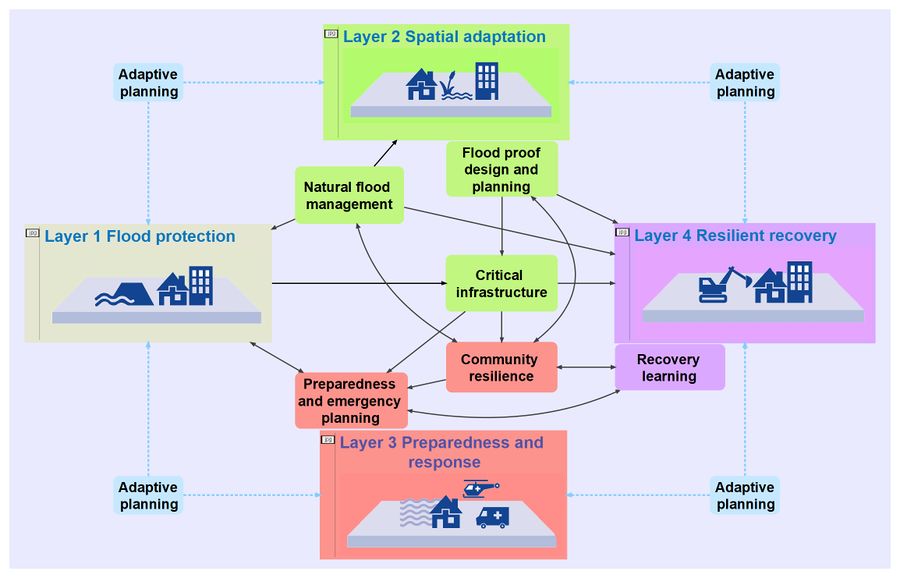Decision Support System
Decision support for resilient authorities working on MLS strategies
The uncertainty of climate change is a major challenge for flood managers to make robust decisions about flood management options in the North Sea Region countries. In addition, the governance settings of each country adds to the complexity of joint decision making for climate change adaptation to increase flood resilience. A so-called decision support system, or DSS, can assist authorities to identify the best options to increase flood resilience in their region.
The DSS is an integrated framework harmonized with the National Adaptation Strategies of the FRAMES countries, to support authorities during their decision-making process concerning more diversified and balanced strategies for flood risk management in their region.
The DSS has been jointly developed by the FRAMES consortium as a learning evaluation of the pilot activities; the experiences from all pilots have been integrated in the framework and local and regional contexts, climate, socio-economic, and hydraulic drivers were considered. Via the learning evaluation in FRAMES relevant target groups for the DSS have been involved in the development: local/ regional/ national authorities from involved regions, infrastructure and (public) service providers, interest groups (NGOs) and higher education and research centres. Based on the interviews with pilot managers, transnational focus groups and monitoring of pilot outcomes, the DSS brings together the transnational learning and knowledge from 16 FRAMES pilots into the MLS approach. The lessons learnt were also translated into policy recommendations.
Figure 1: Decision Support System - click on the boxes to find out more.
In this DSS, we link the knowledge gained from the 16 pilot projects to the layers of the MLS approach. By clicking on the boxes in the figure above, the following information will be provided:
- A description of the action
- The application of this action in FRAMES
- Inter-dependencies with other MLS actions
- Lessons learnt in FRAMES
- Relevant adaptive capacities
- Tools applied in FRAMES
Based on the experience in FRAMES, the highlighted actions in the DSS framework provide:
- Authorities responsible for flood resilience: an overview and relevant knowledge in exploring a variety of MLS actions for enhancing FRM strategies.
- National/regional authorities: support for regional/local authorities in the adaptive planning of their area, taking into account climate change uncertainties and flood proof design and planning of spatial investments.
- Local and regional authorities: the possibility to conduct area based studies and explore additional actions to fine tune FRM strategies in their area or catchment.
- NGOs involved in natural flood management (NFM) and community resilience: the possibility to align their activities with mainstream FRM strategies
- NGOs and interest groups: strategies and tools to empower local communities to have a voice in FRM.
- Infrastructure and service providers: a position in the field of flood resilience.
- Higher education and research centres: available knowledge and cases on diversification of FRM and flood resilience.
Note that these actions, links and insights are the outcome of the pilot projects of the specific regions selected for FRAMES. Using this DSS for other regions will provide more insight into the possibilities and linkages of the MLS approach, but the exact recipe for successfully implementing MLS measures in other regions requires additional information about the governance context, the current flood risk management strategies, current and future flood scenarios and socio-economic development.
For questions, remarks or other comments, feel free to contact the researchers of the HZ University of Applied Sciences by clicking here.


